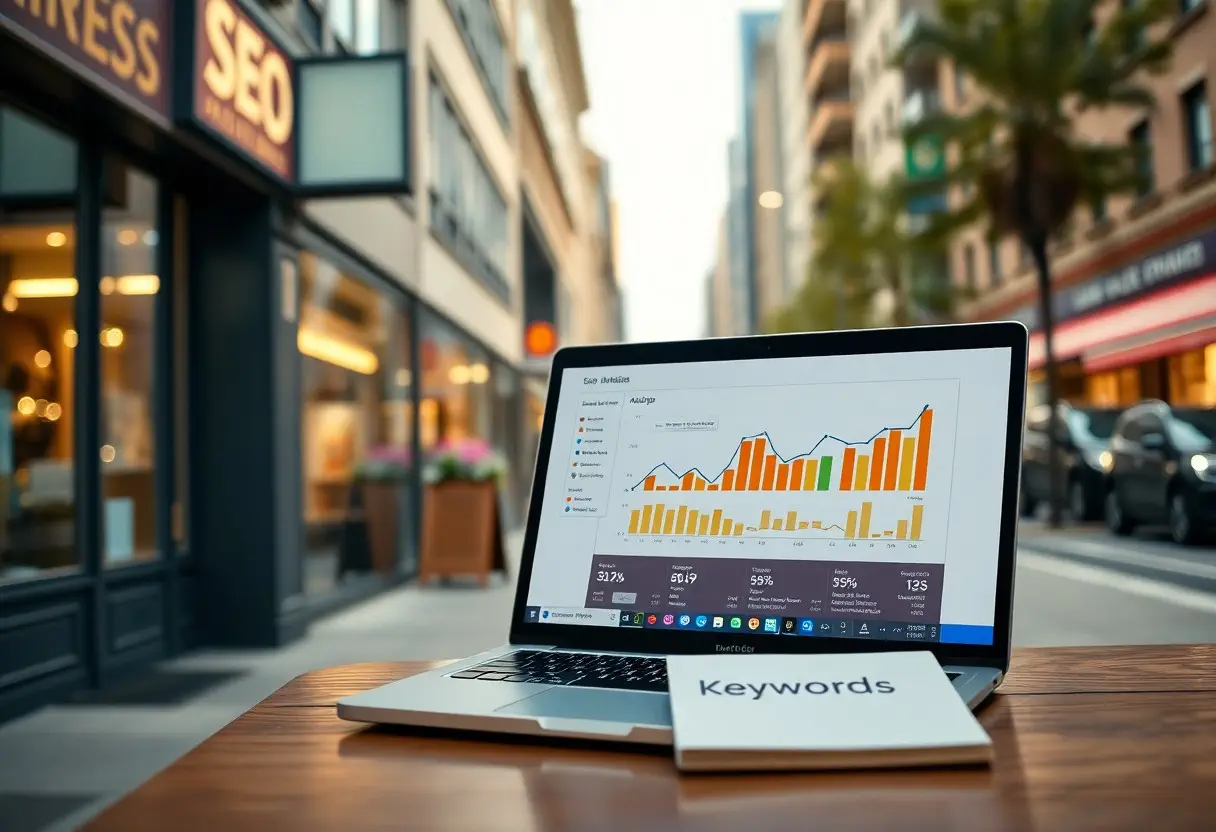
There’s a competitive landscape for small businesses in New Jersey, and mastering SEO is key to standing out. In this guide, you’ll learn effective strategies to enhance your online visibility and improve your Google rankings. By implementing targeted techniques, you’ll be able to attract more customers and leave your competitors behind. For further insights, check out these 10 Tips on How to Outrank Your Competition in Google and start building a stronger online presence today.
Key Takeaways:
- Keyword Research: Identifying the right keywords is imperative for targeting your audience effectively.
- On-Page SEO: Optimize your website’s content and structure to improve search engine visibility.
- Local SEO: Focus on local listings and Google My Business to enhance your presence in local search results.
- Quality Content: Creating valuable and relevant content helps to engage users and encourages backlinks.
- Competitor Analysis: Regularly analyze your competitors to understand their strategies and identify opportunities to outperform them.

Understanding SEO
Your journey to outranking competitors starts with a solid understanding of Search Engine Optimization (SEO). SEO is the process of enhancing your website’s visibility on search engines like Google, making it easier for potential customers to find you. By fine-tuning various elements of your online presence, from keywords to backlinks, you can significantly improve your rankings and attract more organic traffic.
What is SEO?
Any effort to optimize your website for search engines is encapsulated in the term SEO. It involves strategies and practices designed to improve your site’s position in search results. When done effectively, SEO can drive targeted traffic, enhance user experience, and ultimately lead to more conversions.
Why SEO is Important for Small Businesses
Some small businesses overlook the advantages of SEO, but it can give you a competitive edge in your market. By increasing your website’s visibility, you can attract local customers actively searching for your products or services. It’s not just about rankings; it’s about ensuring that your small business is seen by those who are most likely to become customers.
Plus, the benefits of SEO extend beyond visibility. An effective SEO strategy can foster trust and credibility, as users tend to prefer businesses that appear higher in search results. With a strategic approach to SEO, you also save money over time compared to paid advertising methods. By prioritizing SEO, you position your small business for long-term success and establish a solid foundation for growth in a digital-first world.
Key Factors for SEO Success
The world of SEO can be complex, but certain key factors will drive your success. Focus on the following elements to enhance your rankings:
- Keyword Research
- Quality Content
- On-Page Optimization
- Backlink Building
- User Experience
Knowing these factors and implementing them effectively can give you a significant edge. For more insights, check out Local SEO: How To Outrank Your Competitors on Google – Hoist.
On-Page SEO Essentials
Clearly, on-page SEO is the foundation of optimizing your website for search engines. This includes using relevant keywords, crafting compelling titles and meta descriptions, and ensuring your content is structured properly. By enhancing your site’s on-page elements, you can improve visibility and attract organic traffic.
Off-Page SEO Strategies
Clearly, off-page SEO refers to the actions taken outside of your own website to improve its authority and rankings. This typically involves building high-quality backlinks from reputable sources, engaging with your audience on social media, and earning mentions across various platforms.
To maximize your off-page SEO efforts, consider reaching out to influencers in your industry, guest posting on relevant blogs, and participating in online forums or communities related to your niche. Establishing relationships and gaining backlinks from credible websites can significantly bolster your online presence.
Technical SEO Considerations
Little attention is often given to technical SEO, yet it plays a vital role in ensuring your website runs smoothly and is accessible to search engines. Key considerations include optimizing your site speed, ensuring mobile-friendliness, and creating an XML sitemap.
OffPage SEO optimization can not only enhance your website’s visibility but also improve user experience by removing barriers to accessing your content. You must ensure that search engines can crawl and index your site efficiently, leading to better rankings and higher traffic levels.
How to Conduct Keyword Research
Keep your SEO strategy sharp by venturing into keyword research to discover terms your audience is searching for. Utilize Google’s Keyword Planner, SEMrush, or even forums like How Can SEO in NJ Help You Outrank Your Competitors? to identify opportunities to rank higher than your competitors.
Identifying Relevant Keywords
Identifying the right keywords is vital for your business. Start by brainstorming terms related to your products or services, then use tools to find search volume and competition levels. Tailor your list to reflect your target audience’s needs, ensuring the keywords resonate with what they seek.
Analyzing Competitors’ Keywords
One effective strategy for improving your own keyword targeting is to analyze your competitors’ keywords. Look at the keywords they rank for using tools like Ahrefs or Moz, as this can provide insights into gaps you can exploit in your SEO strategy.
To enhance your understanding, assess not only what keywords your competitors rank for, but also the search intent behind them. This analysis can reveal opportunities for you to create better content or optimize your pages to target underutilized keywords, giving you an edge in the search results.
Tips for Enhancing Local SEO
Despite the competitive landscape, there are effective strategies you can implement to enhance your local SEO. Focus on the following tips:
- Optimize your website for local keywords.
- Encourage customer reviews and testimonials.
- Leverage social media for local engagement.
- Ensure consistent NAP (Name, Address, Phone) information across platforms.
- Utilize local backlinks and partnerships.
After integrating these practices, you’ll have a stronger presence in local search results.
Optimizing Google My Business
Assuming you have your Google My Business (GMB) listing set up, the next step is optimization. Make sure all information is complete, including your business hours, website, and services offered. Use high-quality images and engaging content to showcase what makes your business unique, helping you capture the attention of potential customers.
Utilizing Local Listings and Citations
Even small businesses can benefit from being listed in relevant local directories and citations. This includes websites like Yelp, TripAdvisor, or local Chamber of Commerce sites that can improve your visibility. Ensure that your business information is accurate and consistent across these platforms, as this will help boost your authority in local search results.
Google views local listings and citations as a sign of legitimacy for your business. By ensuring that your NAP details are consistent across multiple platforms, you’re not only increasing your chances of being found but also enhancing your credibility in the eyes of potential customers. Focus on reputable, relevant directories to maximize your impact.
Crafting Quality Content
Not every piece of content is created equal; to truly stand out, you need to prioritize quality over quantity. Quality content not only engages your audience but also enhances your website’s authority in search engines. Strive to create informative, relevant, and well-structured articles that resonate with your target audience, making sure to incorporate appropriate keywords seamlessly into your copy. This can help your website rank higher on Google, driving more traffic to your business.
Importance of Creating Valuable Content
If you want to build trust and establish a loyal customer base, creating valuable content is important. High-quality content not only attracts visitors but also encourages them to return and share your material, amplifying your reach. Valuable content addresses your audience’s needs, ultimately enhancing your reputation as an expert in your field.
Tips for Effective Blogging
Effective blogging involves crafting posts that captivate your audience while also being easily discoverable. Here are some tips to improve your blogging strategy:
- Focus on your audience’s needs and interests.
- Utilize SEO best practices, including keywords and meta descriptions.
- Write catchy headlines to draw attention.
- Incorporate multimedia elements like images and videos for engagement.
Perceiving these elements will lead to content that not only resonates but also ranks well. Consistency is key, so regularly publishing fresh content can further improve your visibility.
Tips for blogging can enhance your effectiveness and engagement. Be sure to keep your content innovative and interactive by considering the following:
- Encourage reader interaction through comments and questions.
- Share your posts on social media to widen your reach.
- Analyze your performance to see which topics resonate the most.
- Invite guest bloggers to bring fresh perspectives.
Perceiving these strategies in your approach can significantly boost your blog’s impact and your business’s online presence.

How to Monitor and Analyze Your SEO Performance
Many small business owners overlook the importance of monitoring and analyzing their SEO performance. By keeping a close eye on your ranking, traffic, and engagement data, you can make informed decisions that enhance your online visibility. Regular analysis helps identify trends, opportunities, and areas for improvement, ultimately allowing you to outrank competitors and attract more customers to your New Jersey business.
Tools for Tracking SEO Metrics
You can leverage various tools to effectively track your SEO metrics. Google Analytics, SEMrush, and Moz are excellent platforms for monitoring keyword performance, organic traffic, and website health. By utilizing these tools, you can gain valuable insights into how your efforts are translating into results, and pinpoint areas needing improvement.
Making Data-Driven Adjustments
Performance analysis is important for optimizing your SEO strategy. Use the insights from your tracking tools to identify what works and what doesn’t. By making data-driven adjustments, such as revising content, improving site speed, or refining keyword targeting, you can effectively enhance your online presence and achieve better rankings on Google.
Understanding your data is the key to making informed adjustments to your SEO approach. Look for patterns in user behavior, such as which pages have the highest bounce rates or where you’re losing traffic. This insight will guide your decisions on content updates, backlink strategies, and overall site enhancements. Regularly revising your tactics based on these findings ensures your SEO efforts remain aligned with user needs and search engine algorithms, helping you stay ahead of the competition.
To wrap up
Hence, mastering SEO for your NJ small business is an important strategy to enhance your online presence and surpass your competitors on Google. By implementing effective keyword research, optimizing your website, and utilizing local SEO techniques, you can improve your search rankings and attract more customers. Always keep an eye on your competitors and adapt your strategies accordingly. With dedication and the right approach, you can ensure that your business stands out in the crowded digital market, driving growth and success.
FAQ
Q: What is SEO and why is it important for small businesses in NJ?
A: SEO, or Search Engine Optimization, involves optimizing your website and online presence to improve its ranking on search engines like Google. For small businesses in NJ, effective SEO can enhance visibility, attract more local customers, and ultimately drive sales. Since many consumers look online for services and products, having a strong SEO strategy helps small businesses compete with larger companies and gain a significant foothold in their market.
Q: How can NJ small businesses identify relevant keywords for their target audience?
A: Small businesses can identify relevant keywords by conducting keyword research using tools like Google Keyword Planner, SEMrush, or Moz. Start by brainstorming a list of products or services offered, then look for keywords that potential customers might use when searching online. It is also helpful to analyze competitor websites and see which keywords they are ranking for. Focusing on local keywords that include the NJ area can further enhance local search visibility.
Q: What on-page SEO techniques should NJ small businesses implement?
A: On-page SEO techniques include optimizing title tags, meta descriptions, and header tags with relevant keywords. Additionally, creating high-quality and unique content that effectively answers user queries is important. It’s also beneficial to improve website load speed, ensure mobile-friendliness, utilize alt tags for images, and create internal links to improve site structure. These elements work together to enhance the user experience while signaling to search engines what your page is about.
Q: How can small businesses in NJ leverage local SEO to outrank competitors?
A: Local SEO is vital for attracting customers within your area. Businesses can optimize their Google My Business listing by providing accurate information, such as business hours, address, and contact details. Encouraging satisfied customers to leave reviews can enhance credibility and visibility. Additionally, using local keywords in your content, ensuring consistent NAP (Name, Address, Phone Number) information across directories, and creating location-based content can improve local search rankings.
Q: What role does content marketing play in SEO for NJ small businesses?
A: Content marketing plays a significant role in SEO by providing valuable information to your target audience, which can drive traffic to your site. Creating blog posts, videos, infographics, or guides related to your industry not only helps establish your authority but also encourages other websites to link back to your content, improving your overall SEO. Regularly updating your content and sharing it on social media can also boost engagement and attract more visitors, ultimately supporting your SEO efforts.





